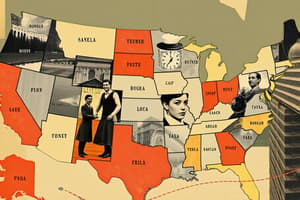Podcast
Questions and Answers
What factors contribute to the growth of the population of the United States?
What factors contribute to the growth of the population of the United States?
- Technological advancements, space exploration, and social media
- Climate change, unemployment rates, and education levels
- Immigration, birth rates, and death rates (correct)
- Agricultural practices, wildlife conservation, and sports events
Which city has the largest urban area population in the United States?
Which city has the largest urban area population in the United States?
- Houston
- Los Angeles
- New York City (correct)
- Chicago
During which period did America experience a baby boom leading to rapid population growth?
During which period did America experience a baby boom leading to rapid population growth?
- First half of the twentieth century (correct)
- Second half of the eighteenth century
- Late nineteenth century
- Early seventeenth century
What are some factors influencing changes in the growth rate of the American population?
What are some factors influencing changes in the growth rate of the American population?
Why might the number of residents in New York City fluctuate according to some reports?
Why might the number of residents in New York City fluctuate according to some reports?
What characteristic of the U.S. population is highlighted in the text?
What characteristic of the U.S. population is highlighted in the text?
What is the average number of children per woman in the US currently?
What is the average number of children per woman in the US currently?
How did immigration contribute to the population size of the US between 2010 and 2019?
How did immigration contribute to the population size of the US between 2010 and 2019?
What happens if the total fertility rate is below the replacement level?
What happens if the total fertility rate is below the replacement level?
How does emigration differ from immigration?
How does emigration differ from immigration?
Why do immigrants tend to migrate to places with stronger economies and higher standards of living?
Why do immigrants tend to migrate to places with stronger economies and higher standards of living?
What potential issues are highlighted in relation to foreign workers in the US?
What potential issues are highlighted in relation to foreign workers in the US?
Flashcards are hidden until you start studying
Study Notes
Population of the United States
The population of the United States is currently estimated by various sources to be approximately 331 million people, making it one of the most populous countries in the world. This figure has been growing over time due to factors such as immigration, birth rates, and death rates. The largest city in the country is New York City, with an urban area population of around 9.7 million residents according to the United Nations World Urbanization Prospects report from July 2020. However, this number fluctuates because there isn't always agreement on what constitutes a metropolitan region. For instance, some reports might count cities up to a certain distance away while others do not. Overall, the U.S. population is diverse, representing many different ethnicities, cultures, and social groups.
Growth Rates in American Population
Historically, the growth rate of the American population has varied over the years. In the early days after its founding, America was sparsely populated; however, during the first half of the twentieth century, a baby boom occurred, causing rapid growth in the population size. After World War II, the country experienced another slow period of growth before seeing a resurgence later. Factors influencing these changes include technological advancements, economic conditions, political events, and other significant societal shifts. To put things into perspective, if the whole world were made up only of Americans, there would need to be roughly 9 newborn babies every minute just to keep up with natural population growth. Currently, the total fertility rate—the average number of children per woman—is slightly below replacement level at about 1.85 children per woman, which means the overall population is slowly declining unless made up through migration.
Immigration and Emigration
A major contributing factor to the current population size of the US is immigration, where individuals move into the country seeking better opportunities or circumstances. Between the years of 2010 and 2019, nearly ten percent of the entire country's population came from immigrants. These figures don't account for the millions more who come each year. Additionally, emigration occurs when people leave the country permanently. According to data from the Pew Research Center, people tend to migrate to places with stronger economies and higher standards of living. Immigrants also help balance out the workforce, which can lead to faster economic growth. However, overly large numbers of foreign workers could potentially displace native born citizens or create labor market imbalances if they take jobs natives want without learning skills that are needed locally.
In summary, the population of the United States includes both native-born and immigrant individuals. It has grown significantly since its founding and continues to change over time due to various economic, demographic, and sociological influences.
Studying That Suits You
Use AI to generate personalized quizzes and flashcards to suit your learning preferences.





